Rutgers University and New Jersey officials will mark the start of a new era of science instruction and research when they gather Monday to break ground for the new home of the Department of Chemistry and Chemical Biology.

The four-story, 145,000-square-foot facility will provide critically needed teaching, laboratory and support space that will enable Rutgers to expand and accelerate its innovative research in drug design, alternative energy, biomaterials and nanotechnology. Rutgers ranks first among U.S. universities in federal funding for chemistry research.
The $115 million project is funded largely by the state’s 2012 Building Our Future Bond Act.
The new building will be located next to the Wright-Rieman Chemistry Complex on the Busch Campus. The first building in that complex was opened in the late 1940s and additional facilities were built in the 1960s and 1970s. Despite some improvements over the years, the complex cannot accommodate the demands of contemporary science teaching and collaborative, multidisciplinary research.
Core facilities in the new building will include a microscopy suite, a class 100 chemistry clean room as well as optical spectroscopy, nuclear magnetic resonance spectroscopy and X-ray crystallography laboratories.
Classrooms will provide the latest technology to support teaching and learning. The facility’s modular design and versatile infrastructure will allow reconfiguration of labs and classrooms as technology evolves and the needs of students and faculty change.
More than 5,000 students enroll in Rutgers chemistry courses each semester.
In the last decade, 75 percent of Rutgers’ peer institutions have invested in new chemistry facilities. The CCB building will enable Rutgers to better compete for top-notch faculty and the best and brightest students.
It is slated for completion in fall 2016, the year Rutgers will celebrate its 250th birthday. The project will conform to state of New Jersey energy mandates and guidelines, and Rutgers seeks to achieve a Leadership in Energy and Environmental Design (LEED) Gold certification by reducing energy usage with numerous “green” features.